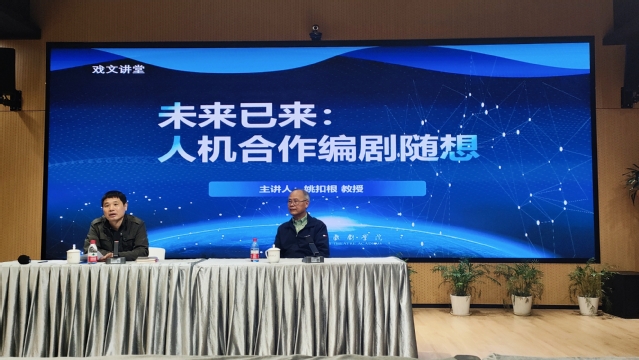
On 9 April, the Party General Branch of the Department of Dramatic Literature hosted a lecture titled "The Future Has Arrived: Some Thoughts on Human-Machine Collaboration in Playwriting." Professor Yao Kougen from the Chinese Playwriting Faculty Team of the Shanghai Theatre Academy was invited to share his insights. With his extensive knowledge and profound understanding, Professor Yao revealed the groundbreaking applications of artificial intelligence in the field of playwriting and the boundless possibilities for new models of literary and artistic creation. The lecture was moderated by Professor Chen Jun, Dean of the Department of Dramatic Literature and Deputy Secretary of the Party General Branch. Teachers and students from the department actively participated in the discussion.

Professor Yao Kougen began by emphasizing the significant role of artificial intelligence in today's society. He illustrated the trend of major companies exploring AI and the current research status by listing various developmental milestones of AI. He mentioned that AI is not just a tool but also an innovative force capable of profoundly changing our way of living and working. He also pointed out that while numerous universities and research institutions are actively studying AI's applications, what truly needs to be unlocked is our understanding, imagination and thinking about the combination of AI with literary and artistic creation.

Looking back at history, Professor Yao remarked on the staggering pace of AI development. From AI's impressive performance in the Go game arena in 2016 to the emergence of AI in playwriting the same year, each breakthrough has refreshed our understanding. Go, as a symbol of human intelligence, was once considered an area where machines could not tread, but AI's remarkable performance completely shattered this notion. Similarly, the advent of AI in playwriting and its increasingly widespread application in the theatrical and film industry has revealed its infinite potential in the realm of literary and artistic creation.
Professor Yao further pointed out that although AI in playwriting had a seemingly rough start, it holds great potential. With continuous technological advancements, AI in playwriting is gradually maturing. He mentioned many research institutions and researchers around the world who are exploring AI in the artistic creation field of drama and music, achieving a series of notable results, such as scripts created by AI like "South Park." These achievements showcase a future filled with limitless possibilities for AI within the domain of literary and artistic creation.
Professor Yao delved into the development of AI in playwriting abroad. As an expert who has deeply involved in the field of playwriting studies, he is well-versed in the techniques used in AI playwriting, such as the pyramid structure of playwriting. Despite the constant innovation in AI technology, Professor Yao does not believe that AI playwriting will completely replace humans. On the contrary, he emphasizes the importance of human-machine collaboration. He believes that future literary and artistic creation will not be the work of machines alone but will require the joint cooperation and inspiration of humans and machines. Professor Yao thinks that AI can guide playwriting practice and skill training and enhance aesthetic capabilities and imagination. This collaborative model will bring a new creative experience and ideas, pushing literary and artistic creation to new heights.

Lastly, with philosophical and forward-thinking, Professor Yao painted a beautiful future of human-machine cooperative playwriting. He encouraged creators to actively embrace AI technology, expand their creative boundaries and possibilities, and together promote the thriving development of dramatic creation.
The event concluded successfully amidst the applause of teachers and students. Inspired by Professor Yao Kougen, everyone deeply felt the close connection and endless possibilities between artificial intelligence and literary and artistic creation. The future has arrived, and the collaborative scriptwriting between humans and machines will bring more brilliance and surprises to the art world.



